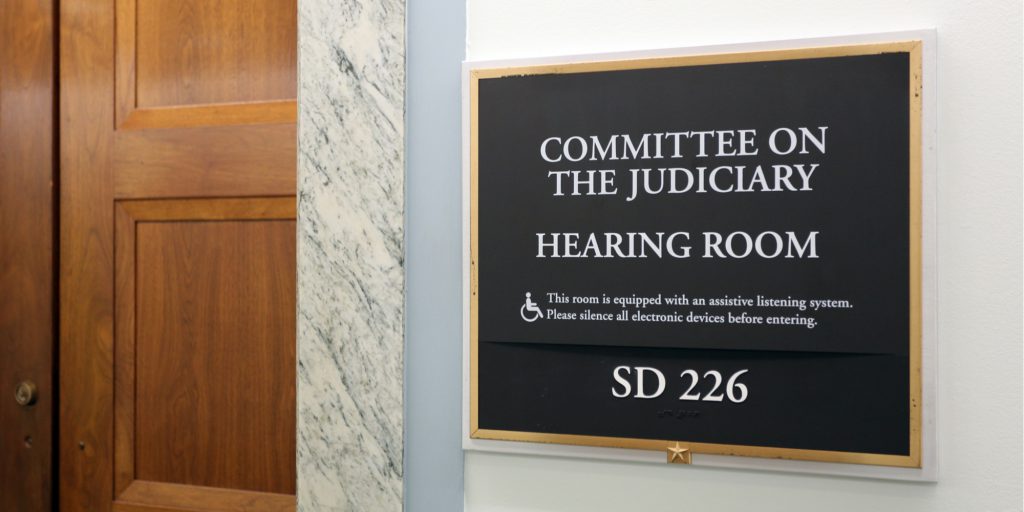
Published March 17, 2021
EPPC Kate O’Beirne Fellow Mary Rice Hasson delivered the following testimony at a Senate Judiciary Committee Hearing on the Equality Act on March 17, 2021. Download a PDF file of this testimony here; view a video of her testimony here and a video of the entire hearing here.
Chairman Durbin, Ranking Member Grassley, and Members of the Committee:
Thank you for the opportunity to speak to you today about the Equality Act. My name is Mary Hasson. I am the Kate O’Beirne Fellow at the Ethics and Public Policy Center in Washington, DC, where my work focuses on policies affecting women, families, and religious liberty. The views expressed in my testimony are my own and should not be construed as representing any official position of EPPC.
Let me begin by stating clearly that I believe unjust discrimination is wrong and all Americans should be treated fairly. Affirming the dignity of all human persons is central to my Catholic faith.
So too is another truth about the human person: that we are created male or female, irrevocably, from the moment of conception. We’ve heard today about the threats posed by the Equality Act to females. I share those concerns, because biological sex—and the difference between males and females— matters, in law, in medicine, and (for many of us) in the practice of our faith.
The Equality Act goes where no federal law has gone before: it redefines “sex” with no reference to “biological distinctions between male and female”—which was the premise of the Supreme Court’s Bostock decision. [1] Instead, it defines sex as “stereotypes,” “sex characteristics” (breasts, genitals, etc.), pregnancy, sexual desires (“sexual orientation”) and self-perception (“gender identity”). “Gender identity,” in turn, is defined by characteristics “regardless of…sex.” The Equality Act thus cements into the law the ideological belief that identity is wholly self-defined, regardless of the sexed body. It suppresses the opposing belief—and punishes those who would dissent.
But sex does matter. Only females go through female puberty, get pregnant, give birth and go through menopause. That’s biology, and no one can self-define into or out of biological reality. Biology also makes females uniquely vulnerable when safety and privacy are compromised: nine out of ten victims of sexual assault are female.
When the law privileges “gender identity” (or “self-perception”) over sex, females suffer the consequences. Alexis Lightcap knows this from experience. Alexis, an African-American teen adopted after a turbulent childhood, learned the importance of standing up for her privacy and her beliefs early on. Alexis’s public high school instituted a policy privileging gender identity over sex, granting biological males access to girls’ restrooms and locker rooms —just like the Equality Act does. When Alexis discovered a male in her school restroom—permitted under the gender identity policy—she asked the school to protect her privacy and safety by preserving female-only restrooms. The school refused. She and others sued, only to have the judge take sides against the sex-based needs of girls like Alexis, effectively telling her—and millions of girls like her—that her feelings, and her needs for privacy and safety, don’t matter. When gender identity is privileged over biological sex, females lose. It’s that simple.
But there’s more.
The Equality Act threatens serious harm to religious believers and religious organizations, stripping away crucial protections afforded under the Religious Freedom Restoration Act—a law enacted in 1993 with overwhelming, bipartisan support. The Equality Act attacks First Amendment rights as well, inserting language that attempts to tip the scales against believers if they assert claims under the First Amendment or Equal Protection.
The Equality Act reaches far beyond Bostock (which pertained to workplace discrimination) by expanding “public accommodations” to permit discrimination claims wherever Americans “gather,” even virtually. The result? Churches, synagogues, temples, faith-based schools, soup kitchens, and shelters for battered women will be subject to government coercion pressuring them to compromise their religious beliefs or risk endless litigation.
Recipients of federal funds, including houses of worship, religious schools and other faith-based organizations are litigation targets under the Equality Act as well—even for something as simple as maintaining sex-segregated bathrooms. This means a Muslim food bank, Catholic homeless shelter, or Christian center for female survivors of domestic violence will be punished for doing good while following their religious teachings.
Similarly, any private school that enrolls students who receive Pell grants or who participate in school lunch programs are subject to the Equality Act’s sex discrimination provisions. Urban Catholic schools, for example, which provide life-changing education to low-income children would face an untenable choice: violate their deeply held religious beliefs about human nature, sexual difference, and marriage or close their doors to students who rely on federal help.
Adoption and foster care programs run by religious believers who desire to serve the most vulnerable are also at risk. Melissa Buck, for example, is a generous, warm-hearted woman. She and husband Chad welcomed five special needs children into their home by adoption, with the assistance of St. Vincent Catholic Charities. St. Vincent specializes in finding forever homes for sibling groups and children with special needs, matching them with loving mothers and fathers like Melissa and Chad.
But the state of Michigan has a different agenda: it seeks to prevent faith-based agencies like St. Vincent from serving families like Melissa’s unless they change their religious beliefs to please the state. In 2019, Michigan’s Attorney General announced the end of state partnerships with agencies like St. Vincent, punishing them—and the families they serve—for their beliefs. No same-sex couple has been unable to foster or adopt because of St. Vincent’s religious beliefs, and St. Vincent refers same-sex couples to other agencies as needed. But still the state seeks to punish St. Vincent—depriving children of placement with loving families like Melissa’s.
When Melissa, St. Vincent, and others sued the state of Michigan—seeking the court’s help to let them serve—the district court ordered Michigan to stand down.
The court’s order contains a lesson for us today: The court noted that “the State’s real goal is not to promote non-discriminatory child placements, but to stamp out St. Vincent’s religious belief and replace it with the State’s own.”
The Equality Act, Mr. Chairman, betrays similar hostility to religious believers and religious organizations, seeking to coerce people of faith to exit the public square unless they trade their religious beliefs for the reigning ideology of today. If the First Amendment means anything, it means protection for people to live out their beliefs even—and especially—when people disagree.
For these reasons, and others, I oppose the Equality Act.
[1] Bostock v. Clayton Cty., Georgia, 140 S. Ct. 1731, 1739, 207 L. Ed. 2d 218 (2020)












